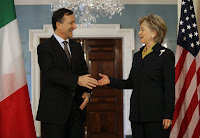Can you believe the conservative government's latest screw up?
Tensions between the Canadian Borders Services Agency (CBSA) and representatives of the Akwesasne Mohawk Reserve on Cornwall Island, had been growing since the GoC's announcement on May 1, 2009, that CBSA officials would start carrying duty firearms starting June 1st.
Mohawk leaders pleaded for an exception given that the border lies on Mohawk land, and feared the symbolic implications of seeing armed Canadian officials manning the border crossing. Protests had also been held.
According news reports, in the face of the ongoing spat, Public Safety Minister Peter Van Loan has recently ordered the Border post be moved inland in the form of a "makeshift checkpoint," from where they have been operating since July 12, under RCMP protection.
What a great idea! The Conservatives have effectively managed to kill two (perhaps three) birds with one stone...
First, they have unilaterally retracted the reach of Canadian sovereignty- the principal meaning of which, Max Weber reminds us, is the monopoly over the use of legitimate violence within a bounded territory. The move, as a matter of fact affects both elements of sovereignty contained in this textbook definition: Firstly, in the face of the well known and public revendications of the Mohawk community to establish a Mohawk sovereign state, the territorial integrity of Canada has been somehow undermined, if not jeopardised, and potentially, a precedent lain. And God forbid, Quebec separatists should hear about this story... Secondly, the monopoly of legitimate violence over the area has been relinquished. Perhaps not the domestic policing side of it- reports are not specific enough on this matter- but certainly the defense from external threats.
Second, they have created one of those dreaded no-man's lands outside of any control that punctuate the world -with due distinctions, but similar to Transnistria, the South American Tri-border area, or the Ferghana Valley- at the heart of North America. Fears have been expressed that this will curtail attempts to control drug and Tobacco smuggling, and bolster organized crime groups. To this should be added the more serious security threats that a patch of anarchy within Canadian territory could generate, should the situation extend itself, for both Canada and the United States.
This latter point leads us to the third bird of the potential repercussions on bilateral relations with the United States, who remain highly focused on the countering of asymmetric threats and the protection of the continent from potential attacks. This could spur renewed distrust in a Northern neighbour that simply does not do enough for the Security of North America. For a government broaching itself as a champion of law and order, and the first Executive taking security seriously, the handling of the border crossing issue grazes on ridicule.
Tensions between the Canadian Borders Services Agency (CBSA) and representatives of the Akwesasne Mohawk Reserve on Cornwall Island, had been growing since the GoC's announcement on May 1, 2009, that CBSA officials would start carrying duty firearms starting June 1st.
Mohawk leaders pleaded for an exception given that the border lies on Mohawk land, and feared the symbolic implications of seeing armed Canadian officials manning the border crossing. Protests had also been held.
According news reports, in the face of the ongoing spat, Public Safety Minister Peter Van Loan has recently ordered the Border post be moved inland in the form of a "makeshift checkpoint," from where they have been operating since July 12, under RCMP protection.
What a great idea! The Conservatives have effectively managed to kill two (perhaps three) birds with one stone...
First, they have unilaterally retracted the reach of Canadian sovereignty- the principal meaning of which, Max Weber reminds us, is the monopoly over the use of legitimate violence within a bounded territory. The move, as a matter of fact affects both elements of sovereignty contained in this textbook definition: Firstly, in the face of the well known and public revendications of the Mohawk community to establish a Mohawk sovereign state, the territorial integrity of Canada has been somehow undermined, if not jeopardised, and potentially, a precedent lain. And God forbid, Quebec separatists should hear about this story... Secondly, the monopoly of legitimate violence over the area has been relinquished. Perhaps not the domestic policing side of it- reports are not specific enough on this matter- but certainly the defense from external threats.
Second, they have created one of those dreaded no-man's lands outside of any control that punctuate the world -with due distinctions, but similar to Transnistria, the South American Tri-border area, or the Ferghana Valley- at the heart of North America. Fears have been expressed that this will curtail attempts to control drug and Tobacco smuggling, and bolster organized crime groups. To this should be added the more serious security threats that a patch of anarchy within Canadian territory could generate, should the situation extend itself, for both Canada and the United States.
This latter point leads us to the third bird of the potential repercussions on bilateral relations with the United States, who remain highly focused on the countering of asymmetric threats and the protection of the continent from potential attacks. This could spur renewed distrust in a Northern neighbour that simply does not do enough for the Security of North America. For a government broaching itself as a champion of law and order, and the first Executive taking security seriously, the handling of the border crossing issue grazes on ridicule.



